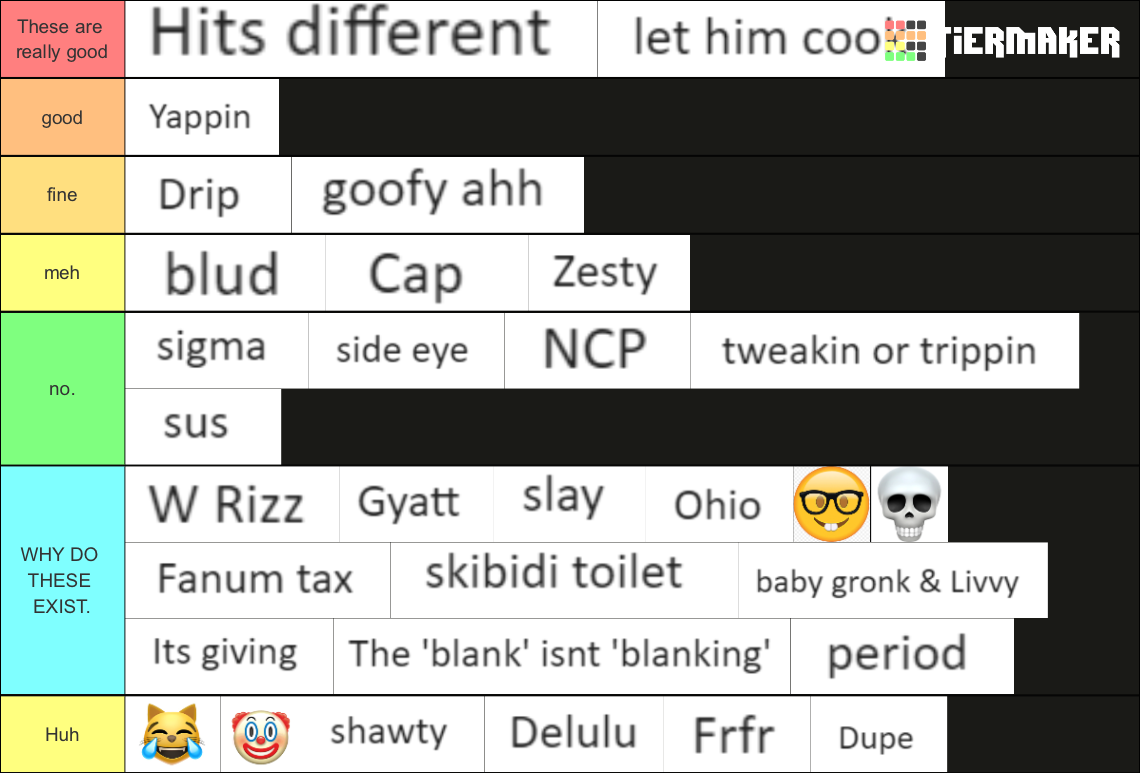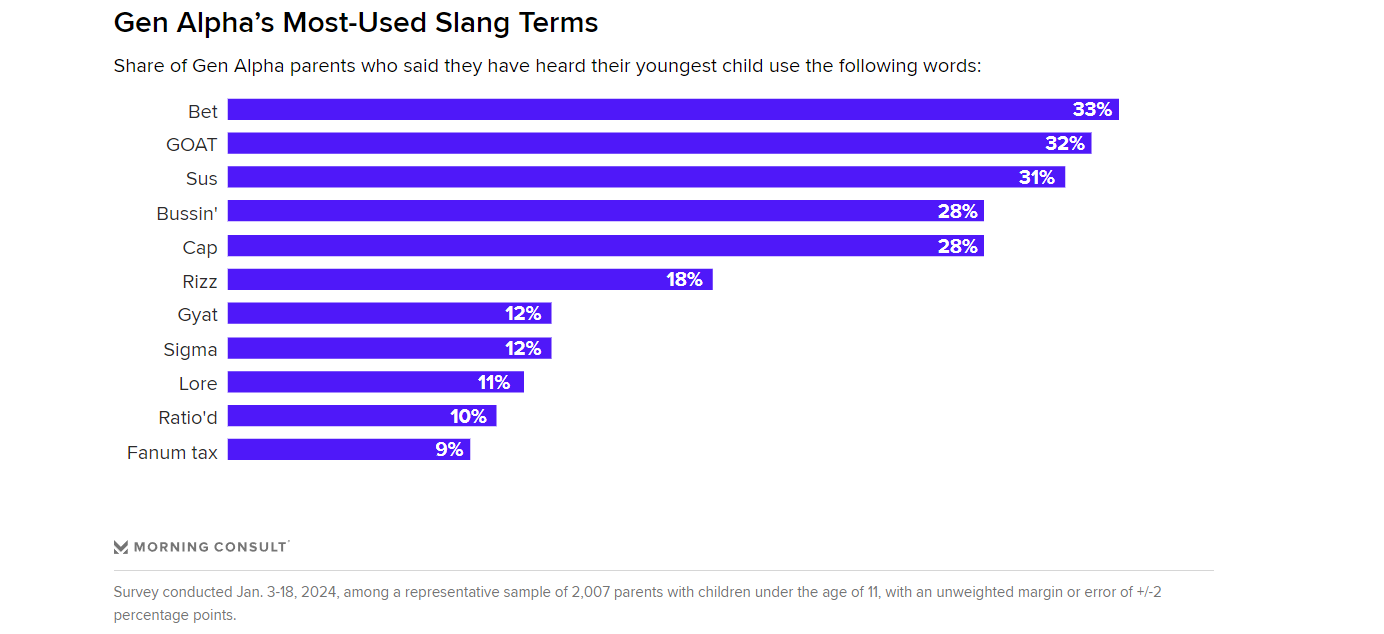Gen Alpha Slang Decoded: Rizz, Skibidi & More Explained!
Are you prepared to decipher a language that's evolving at warp speed, a dialect spoken by those born into a digital whirlwind? Welcome to the perplexing, often hilarious, and utterly fascinating world of Gen Alpha slang, where "rizz" reigns supreme, and "skibidi" can mean almost anything.
Generation Alpha, encompassing those born from 2010 to the present, has swiftly crafted its unique lexicon. This linguistic landscape is shaped by the internet's currents, the whimsical tides of viral trends, and the ever-shifting sands of social media. Just as previous generations developed their own distinct modes of expression, Gen Alpha is solidifying its identity through its own vibrant vocabulary. Navigating this new territory can feel like learning a foreign language, even for those who consider themselves relatively tech-savvy. Terms that may seem cryptic to older generations, like "fanum tax" or "mogwarts," are everyday currency for these digital natives.
To illustrate the complexity of Gen Alpha slang, consider this sentence: "Nah let bro cook, it's gonna be rizzmas in a few months of mewing and we're griddying to mogwarts and you owe me fanum tax." It's a sentence loaded with meaning for Gen Alpha, but might leave others scratching their heads. Let bro cook means let your friend do their thing. "Rizzmas" combines "rizz" (charisma) with Christmas, hinting at a time of heightened social appeal. "Mewing" is a technique to improve jawline, and "mogwarts" likely combines "mog" (to dominate or outshine) with Hogwarts. The speaker seems to be headed somewhere exciting. Finally, the "fanum tax" is an expectation of sharing content or benefits. The ability to understand this generation's language is the key to keeping up and understanding this generation.
The rise of Gen Alpha's unique slang mirrors a broader cultural shift, influenced by the immediacy and interactivity of online platforms. From TikTok dances to YouTube Shorts, and trending video games, the content consumed by this generation provides fertile ground for new words and phrases to sprout and flourish. The quick-fire nature of the internet means trends and language constantly evolve, with terms gaining traction, then fading, with remarkable speed.
| Term | Definition | Example |
|---|---|---|
| Rizz | Charisma, charm, the ability to attract a romantic partner | "He's got serious rizz, he can talk to anyone." |
| Skibidi | Derived from a viral song and dance; can be used to express excitement, or as a general exclamation | "Skibidi! That new game is awesome." |
| Drip | Stylish clothing or a general sense of coolness. | "Look at that drip, man! Where'd you get those shoes?" |
| Sigma | A dominant or self-reliant individual. | "He's a sigma; always knows what he wants." |
| Fanum Tax | An obligation to share or contribute to a shared resource, often content or benefits. | "I made a great video, you owe me the fanum tax and need to share it." |
| Mog | To dominate or outshine someone else. | "He completely mogged the competition." |
| Brainrot | Content so repetitive, mindless, or addictive that it feels like it's decaying the brain. | "I spent all day watching those videos, total brainrot." |
The influence of online platforms has birthed a linguistic culture where the use of slang terms such as "fanum tax" and "skibidi" has become commonplace. These words are not merely linguistic novelties; they are signals that show participation in the online world. The constant innovation and remixing of terms showcase how this generation is making its own identity in the digital realm, establishing them as trendsetters and innovators in language.
Moreover, slang words can change very rapidly in reaction to trends, memes and content on social media. As new slang appears, a phrase might gain prominence and quickly lose its appeal as a more current version takes its place. This continuous linguistic evolution necessitates a keen awareness of emerging trends and platforms.
For those outside Gen Alpha, the challenge lies in keeping pace. This is important for parents, educators, and anyone seeking to understand the younger generation. Just when you think you've mastered the slang of Millennials and Gen Z, along comes Gen Alpha, armed with its own vocabulary, creating a communication gap. The ability to decode this language is more than just a matter of curiosity; it's a key to connecting and engaging with the rising generation, with an ability to bridge the communication gap.
The evolution of Gen Alpha slang is a testament to the power of digital culture in shaping how we communicate. It's a dynamic and fascinating phenomenon, reflecting the creativity and adaptability of a generation coming of age in a world defined by rapid technological change. While it might seem like a secret language, understanding its nuances offers a unique window into the minds and experiences of Gen Alpha. Learning the terms and their meanings offers a chance to participate in the evolving linguistic landscape, but also to understand and connect with the youth of today and the future.
As the digital era marches on, it is no surprise that Gen Alpha has chosen to build its own linguistic identity. The slang, the "rizz", the "skibidi" - these are not just words. They are markers of a generation shaping its voice and identity, one meme, one trend, and one viral video at a time. So, if you want to connect, don't be afraid to dive in, decipher, and perhaps even adopt a few of these terms. It's a journey, a fun and exciting one, that helps to decode the code of Gen Alpha.


